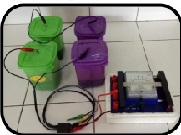Bioelectrochemical Systems (BESs) Technology for The Production of Electrical Energy from Kepok Banana Stem
Abstract
Bioelectrochemical Systems (BES) technology is a method for generating electric energy using bacteria as catalysts. The electricity is produced by Microbial Fuel Cells (MFCs), which represent the latest development in biological energy research. This study utilized substrates from banana stems and the bacterium Pseudomonas sp. The research aims to assess the potential of banana stems as a substrate in the MFC system and to determine the effects of adding a combination of an electrolyte solution and an appropriate buffering material to achieve maximum current, potential difference, and power density values. The results showed that the maximum current and potential difference achieved were 1.05 mA and 0.62 V, respectively, with a power density value of 446 mW/m². When combining the KMnO4 electrolyte solution with sodium phosphate buffer, a potential difference of 0.76 V and a current of 1.75 mA were obtained, resulting in a power density value of 911 mW/m². By using the K3[Fe(CN)6] electrolyte solution buffer with potassium phosphate buffer, a current of 1.14 mA was produced, and the power density value reached 406 mW/m².
Downloads

Copyright (c) 2023 Sitti Chadijah, Firnanelty Firnanelty, Maswati Baharuddin Baharuddin, Sappewali Sappewali

This work is licensed under a Creative Commons Attribution-NonCommercial-NoDerivatives 4.0 International License.
Authors who publish with this journal agree to the following terms:
- Copyright on any article is retained by the author(s).
- The author grants the journal, the right of first publication with the work simultaneously licensed under a Creative Commons Attribution License that allows others to share the work with an acknowledgment of the work’s authorship and initial publication in this journal.
- Authors are able to enter into separate, additional contractual arrangements for the non-exclusive distribution of the journal’s published version of the work (e.g., post it to an institutional repository or publish it in a book), with an acknowledgment of its initial publication in this journal.
- Authors are permitted and encouraged to post their work online (e.g., in institutional repositories or on their website) prior to and during the submission process, as it can lead to productive exchanges, as well as earlier and greater citation of published work.
- The article and any associated published material is distributed under the Creative Commons Attribution-NonCommercial-NoDerivatives 4.0 International License.





_copy1.png)










